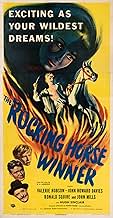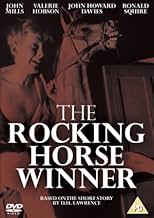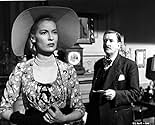AVALIAÇÃO DA IMDb
7,2/10
1,5 mil
SUA AVALIAÇÃO
Adicionar um enredo no seu idiomaA young boy receives a rocking horse for Christmas and soon learns that he is able to pick the winning horse at the races.A young boy receives a rocking horse for Christmas and soon learns that he is able to pick the winning horse at the races.A young boy receives a rocking horse for Christmas and soon learns that he is able to pick the winning horse at the races.
- Direção
- Roteiristas
- Artistas
Anthony Holles
- Bowler Hat
- (não creditado)
Melanie Mackenzie
- Matilda Grahame
- (não creditado)
Michael Ripper
- 2nd Chauffeur
- (não creditado)
Johnnie Schofield
- 1st Chauffeur
- (não creditado)
Caroline Steer
- Joan Grahame
- (não creditado)
- Direção
- Roteiristas
- Elenco e equipe completos
- Produção, bilheteria e muito mais no IMDbPro
Avaliações em destaque
The Rocking Horse Winner is directed by Anthony Pelissier, who also adapts the screenplay from the D. H. Lawrence short story of the same name. It stars Valerie Hobson, John Howard Davies, Ronald Squire, John Mills, Hugh Sinclair and Susan Richards. Music is by William Alwyn and cinematography by Desmond Dickinson.
Dreadful, Evil Money.
There's a handful of British films from the 1940s that deserve to be far better known, films that blended haunted themes with film noir traits and visual smarts. The Night Has Eyes, Uncle Silas, Corridor Of Mirrors and the magnificent Queen Of Spades readily come to mind. Now it has an official DVD release, we can add Anthony Pelissier's brilliant The Rocking Horse Winner to the obscure gem list.
Story has young Paul Grahame (Davies) receiving a weird looking Rocking Horse for Christmas. He's an introverted and sensitive lad, seemingly reaching out for some sort of guidance from his parents. Unfortunately his mother, Hester (Hobson), is a spendthrift badly hung up on money as some sort of status symbol, while his father, Richard (Sinclair), is a gambler, and not a good one at that. With Uncle Oscar Creswell (Squire) bailing them out of financial trouble for the last time, the Grahame family are heading for bankruptcy unless income can be found. Befriending the new handyman, Bassett (Mills), Paul is delighted to find that Bassett is an ex-jockey and regales him with tails of horse racing, he even learns from Bassett how to ride his Rocking Horse like a real jockey. Then something magical happens, Paul seems to be able to predict the winners of real horse races, and the money starts to roll in
D. H. Lawrence's story gets a faithful adaptation and transfers quite excellently to the screen. It's a haunting fantasy at heart, but one tinged with utter sadness, and being Lawrence it has a sex metaphor sitting right in the middle of the greed and exploitation thematics. As story progresses, it soon becomes evident that Paul has to ride his Rocking Horse to a frenzied climax, if he doesn't get there then he will not see the name of the next race winner. Initially he is thrilled to be able to win lots of money, the house seems to be telling him that his parents must have more money, so aided by Bassett, he is saving the cash to help his frantic mother, who by now has resorted to pawning possessions for cash. But the more he wins, and the more Bassett and Uncle Oscar also profit, the further away from his parents Paul gets. Soon enough it's going to come to a head and it will prove to be devastating for the Grahame family.
Pelissier, Alwyn and Dickinson each work respective wonders to smoother the picture with a sense of the unearthly, not so much supernatural, but like a blurry discord, a purgatory where ignorant parenting dwells and childhood innocence is corrupted. Pic is crammed with sinister imagery. The Rocking Horse itself is up in the attic, which gives the makers perfect opportunities for shadows to enhance the "unhealthy" scenes of Paul riding away like a boy possessed, while for the key scene Pelissier uses a depth perception technique that is gloriously disorientating. An ascent by Paul up to the attic is moody magnificence, Hester's visit to the back room Pawnbroker (Charles Goldner) drips with unease, while the finale features a near demonic last shot that literally will be burned into your soul.
With top performances from the cast to seal the deal, this tale of a boy and his Rocking Horse gnaws away at the senses as the fallibility of the human condition is frighteningly laid bare. 9/10
Dreadful, Evil Money.
There's a handful of British films from the 1940s that deserve to be far better known, films that blended haunted themes with film noir traits and visual smarts. The Night Has Eyes, Uncle Silas, Corridor Of Mirrors and the magnificent Queen Of Spades readily come to mind. Now it has an official DVD release, we can add Anthony Pelissier's brilliant The Rocking Horse Winner to the obscure gem list.
Story has young Paul Grahame (Davies) receiving a weird looking Rocking Horse for Christmas. He's an introverted and sensitive lad, seemingly reaching out for some sort of guidance from his parents. Unfortunately his mother, Hester (Hobson), is a spendthrift badly hung up on money as some sort of status symbol, while his father, Richard (Sinclair), is a gambler, and not a good one at that. With Uncle Oscar Creswell (Squire) bailing them out of financial trouble for the last time, the Grahame family are heading for bankruptcy unless income can be found. Befriending the new handyman, Bassett (Mills), Paul is delighted to find that Bassett is an ex-jockey and regales him with tails of horse racing, he even learns from Bassett how to ride his Rocking Horse like a real jockey. Then something magical happens, Paul seems to be able to predict the winners of real horse races, and the money starts to roll in
D. H. Lawrence's story gets a faithful adaptation and transfers quite excellently to the screen. It's a haunting fantasy at heart, but one tinged with utter sadness, and being Lawrence it has a sex metaphor sitting right in the middle of the greed and exploitation thematics. As story progresses, it soon becomes evident that Paul has to ride his Rocking Horse to a frenzied climax, if he doesn't get there then he will not see the name of the next race winner. Initially he is thrilled to be able to win lots of money, the house seems to be telling him that his parents must have more money, so aided by Bassett, he is saving the cash to help his frantic mother, who by now has resorted to pawning possessions for cash. But the more he wins, and the more Bassett and Uncle Oscar also profit, the further away from his parents Paul gets. Soon enough it's going to come to a head and it will prove to be devastating for the Grahame family.
Pelissier, Alwyn and Dickinson each work respective wonders to smoother the picture with a sense of the unearthly, not so much supernatural, but like a blurry discord, a purgatory where ignorant parenting dwells and childhood innocence is corrupted. Pic is crammed with sinister imagery. The Rocking Horse itself is up in the attic, which gives the makers perfect opportunities for shadows to enhance the "unhealthy" scenes of Paul riding away like a boy possessed, while for the key scene Pelissier uses a depth perception technique that is gloriously disorientating. An ascent by Paul up to the attic is moody magnificence, Hester's visit to the back room Pawnbroker (Charles Goldner) drips with unease, while the finale features a near demonic last shot that literally will be burned into your soul.
With top performances from the cast to seal the deal, this tale of a boy and his Rocking Horse gnaws away at the senses as the fallibility of the human condition is frighteningly laid bare. 9/10
The dialogue is expectedly very British and good. Though a perfunctory performance was all the needlessly limited role of the father required, all other players did wonderfully.
Interestingly, the story concerns a good, but sybaritic mother's avarice and her loving son's obsessive desire to satisfy it. It also plays into the idea of money as an inherent evil while earning my high praise by not taking this too far. It is also another one of many films I have enjoyed on the fascinating subject of gambling.
Interestingly, the story concerns a good, but sybaritic mother's avarice and her loving son's obsessive desire to satisfy it. It also plays into the idea of money as an inherent evil while earning my high praise by not taking this too far. It is also another one of many films I have enjoyed on the fascinating subject of gambling.
This is a very intriguing British film, quite unlike most others from the period; it's a pretty dark Freudian tale, from a D H Lawrence short story, whose overt depiction of a schoolboy and his magic toy gets away with a strictly taboo subtext. The focus is on a well-to-do household of the period, in which the hierarchy of adults and children is strictly defined; the parents try to keep their son Paul, wearing short trousers even in the depths of winter, innocent of their adult concerns in particular, their problems with money. After discovering that his rocking horse gives him secret powers when he rides it hard enough, with giddy camera-work showing how it feels when he 'gets there', the boy tries to usurp his father's role to provide his mother with what she needs. John Mills produced the film, and his interest was no doubt linked to his typecast image: he normally plays rather piously unimpeachable characters, so it's quite a shock to see him here directing the lad's first experience of 'riding'. The only slight difficulty is that the boy actor needed to be nearer his early teens to carry the weight of the story's darker implications.
This particular D.H. Lawrence story has been done three additional times since this version came out in 1950. They would have to go some to compete with this film for drama and suspense.
I had never seen this film before tonight and the title is so incredibly deceptive. I expected a charming children's fantasy, but got something quite a bit different. One thing I would never do is allow small kids to see The Rocking Horse Winner. They will have nightmare's for years and will NEVER want to get on a rocking horse if you have one.
Hugh Sinclair and Valerie Hobson play a pair of post World War II self indulgent parents who are living way beyond their means, like a lot of folks are today on both sides of the pond. He gambles and she spends money on luxury items like there's no tomorrow. Her brother Ronald Squire bails her out a lot, but he's having no more of it.
All this is having an effect on the United Kingdom's best known child star of the time John Howard Davies. He's the oldest of the three kids and a withdrawn, but sensitive kid who knows there's something wrong.
Davies makes friends with the new handyman John Mills who is a wounded war veteran and before the war used to work as jockey in his youth. When Davies gets among other things a rocking horse for Christmas, Mills shows him how to ride ace-deuce, jockey style. Davies becomes obsessed with the horse and after a while he starts imagining the horse telling him about winning tips at the local track. When he's "really sure" these ponies have a habit of coming in.
Given these plot premises it sounds like you're setting up a comedy, but actually what we get is tragedy here, a stark a bitter tragedy.
Anthony Pellisier wrote and directed and John Mills produced this film for J. Arthur Rank. Pellisier used some unique and terrifying camera angles and makes the rocking horse an incredibly sinister figure. And he doesn't do too bad with his human players either.
The Rocking Horse Winner after almost 60 years still holds up well as one of the most sinister films I've ever seen. Don't be fooled by the title, definitely NOT one to have the kids view.
I had never seen this film before tonight and the title is so incredibly deceptive. I expected a charming children's fantasy, but got something quite a bit different. One thing I would never do is allow small kids to see The Rocking Horse Winner. They will have nightmare's for years and will NEVER want to get on a rocking horse if you have one.
Hugh Sinclair and Valerie Hobson play a pair of post World War II self indulgent parents who are living way beyond their means, like a lot of folks are today on both sides of the pond. He gambles and she spends money on luxury items like there's no tomorrow. Her brother Ronald Squire bails her out a lot, but he's having no more of it.
All this is having an effect on the United Kingdom's best known child star of the time John Howard Davies. He's the oldest of the three kids and a withdrawn, but sensitive kid who knows there's something wrong.
Davies makes friends with the new handyman John Mills who is a wounded war veteran and before the war used to work as jockey in his youth. When Davies gets among other things a rocking horse for Christmas, Mills shows him how to ride ace-deuce, jockey style. Davies becomes obsessed with the horse and after a while he starts imagining the horse telling him about winning tips at the local track. When he's "really sure" these ponies have a habit of coming in.
Given these plot premises it sounds like you're setting up a comedy, but actually what we get is tragedy here, a stark a bitter tragedy.
Anthony Pellisier wrote and directed and John Mills produced this film for J. Arthur Rank. Pellisier used some unique and terrifying camera angles and makes the rocking horse an incredibly sinister figure. And he doesn't do too bad with his human players either.
The Rocking Horse Winner after almost 60 years still holds up well as one of the most sinister films I've ever seen. Don't be fooled by the title, definitely NOT one to have the kids view.
In London, the teenager Paul Grahame (John Howard Davies) lives with his upper class but financially broken family. His wasteful mother Hester Grahame (Valerie Hobson) is a compulsive buyer, spending all the family money in new expensive dresses, jewels and objects for their home. His father Richard Grahame (Hugh Sinclair) is a gambler, losing money in the horse races. His uncle Oscar Cresswell (Ronald Squire) is permanently covering the Grahame family debts. When the servant Bassett (John Mills) is hired, Paul finds that he can predict the winner of the horses' races rocking his wooden horse. Paul asks Bassett to become his partner, betting their money in the races, trying to prove that he is lucky and silencing the permanent whisper of the house needing more money. But the prize is high and fatal.
"The Rocking Horse Winner" is a dark tale of compulsion of D. H. Lawrence. I have never read his short story, and I did not feel any sexual connotation as mentioned in some reviews that I have glanced. The story is very disturbing and quite unpleasant, with great direction and performances, especially of Valerie Hobson in the role of a compulsive shallow woman. My vote is seven.
Title (Brazil): "O Cavalo Campeão" ("The Horse Winner")
"The Rocking Horse Winner" is a dark tale of compulsion of D. H. Lawrence. I have never read his short story, and I did not feel any sexual connotation as mentioned in some reviews that I have glanced. The story is very disturbing and quite unpleasant, with great direction and performances, especially of Valerie Hobson in the role of a compulsive shallow woman. My vote is seven.
Title (Brazil): "O Cavalo Campeão" ("The Horse Winner")
Você sabia?
- CuriosidadesBassett says that he had "... fine plans for teaching Gordon Richards a thing or two...". Gordon Richards (1904 - 1986) was an English jockey. He was the Champion Jockey in British flat horse-racing 26 times, a record that still stands.
- Citações
[last lines]
Hester Grahame: I wanted to see the end of it, just wanted to be sure it had gone. Gone for good.
Bassett: You won't never see the end of it, ma'am, nor will I. As long as ever we'll live, we'll remember, and we'll know just what it is was done.
- Trilhas sonorasSilent Night
(uncredited)
Music by Franz Xaver Gruber
English lyrics by John Freeman Young
Sung by the carollers
Principais escolhas
Faça login para avaliar e ver a lista de recomendações personalizadas
Detalhes
- Data de lançamento
- País de origem
- Idioma
- Também conhecido como
- The Rocking Horse Winner
- Locações de filme
- Denham Studios, Denham, Buckinghamshire, Inglaterra, Reino Unido(studio: made at Denham Studios, London, England)
- Empresas de produção
- Consulte mais créditos da empresa na IMDbPro
- Tempo de duração1 hora 31 minutos
- Cor
- Proporção
- 1.37 : 1
Contribua para esta página
Sugerir uma alteração ou adicionar conteúdo ausente



























